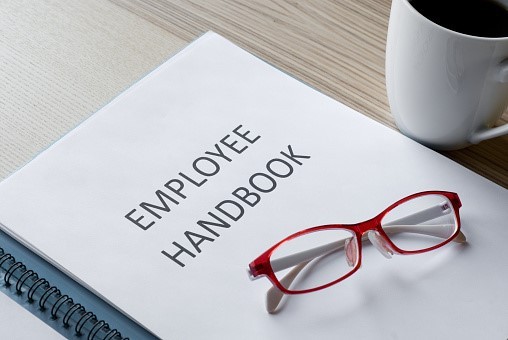New workplace laws on minimum wage, paid sick leave, criminal
background investigations and
more are popping up all the time—and they don’t always take effect at the
beginning of a new year. HR professionals need to communicate these changes
with their workforce as the laws become effective, but how often should you
revise your employee handbook? Employment attorneys told SHRM Online that the answer depends on a few
factors.

Image source: http://woodwardcounsel.com/2016/11/16/employee-handbooks-get-it-right-the-first-time-2/
The frequency of handbook reviews may depend on how big the employer is
and how many states it operates in, said Lucas Asper, an attorney with Ogletree
Deakins in Greenville, S.C.
HR professionals should also consider the purpose that the
handbook serves for the organization—which varies from employer to employer, he
noted. Some businesses just want to cover the minimum that is required by law.
Others might use the handbook as a summary of all the applicable workplace laws
that the HR and management teams rely on when providing guidance. If that’s the
case, they’ll want to be extra careful about making sure the information is
accurate and up-to-date, Asper said.
“Updates should be considered at a minimum on an annual
basis,” said Stephanie Peet and Timothy McCarthy, attorneys with Jackson
Lewis in Philadelphia, in an e-mail to SHRM
Online. “However, sometimes there are drastic changes in
applicable laws that necessitate an immediate change.”
As an example, they said, if Congress were to amend Title VII of
the Civil Rights Act of 1964 to expressly include sexual orientation as a
protected characteristic, employers would need to ensure that sexual
orientation is covered in their equal employment opportunity policy and make
revisions if needed.
That’s why a midyear review is a good idea. “Employers
should make an effort to stay abreast of changes in applicable labor and
employment laws on an ongoing basis,” Peet and McCarthy suggested.
If there are any significant changes to the laws that affect a
particular employer’s workforce, the handbook should be reviewed to ensure that
the company’s policies are in line with those changes.
Notice Is Key
When a new law takes effect, it is vital to give employees
notice, Asper said. But that notice doesn’t always have to be provided through
a formal handbook update.
For midyear changes in the law, employers may want to consider
stand-alone notifications or policy revisions, he added.
Asper said that in many situations, a state-specific addendum
will make sense for multistate employers. The employer can send an addendum to
the applicable workers in California or Wisconsin, for example, instead of
rolling out an entirely new handbook. “That’s the best way to capture
state and local changes,” he said.
Peet and McCarthy noted that handbook updates and stand-alone
policies should be distributed with an acknowledgment that employees should
sign and date. The acknowledgment should clearly identify the version of the
handbook or policy that it relates to, they said.
“In addition, providing digital access to handbooks and
policies, where feasible, is advantageous to both employees and
employers,” they added. “Employees are inevitably becoming more
tech-savvy and will be more likely to review and utilize a digitally accessible
handbook.”
Electronic handbooks also make it easier for employers to
update, edit and distribute critical information.
Changes to Watch
If an employer hasn’t updated its handbook in more than a year,
it’s probably time to do a full-blown review with the assistance of counsel,
Asper said.
That’s because there have been a number of developments in
workplace law recently. At the federal level, for example, there were many National Labor Relations Board
decisions that
affected employment policies.
Employers also should track the ongoing status of the now-halted federal overtime rule,
which would have raised the salary threshold for exempt white-collar workers.
Employers can use a midyear handbook review as an opportunity to
look at job descriptions and corresponding Fair Labor Standards Act
designations, Peet and McCarthy said.
At the state and local level, employers need to
look for new minimum wage, paid-family-leave and paid-sick-leave laws, to name
a few.
Not a lot of federal action is anticipated in the next few
years, so a lot of the big policy modifications will likely be based on state
and local changes, Asper said.
Philadelphia and other jurisdictions throughout the country have
been considering and enacting legislation banning employer inquiries into
applicants’ salary histories. These laws are significant because they will
require many employers to change the way they engage in the recruiting process
from the application stage forward, Peet and McCarthy said.
“State and local ‘ban-the-box’ laws that restrict the
extent to which criminal backgrounds may be considered in the hiring process
are also cropping up rapidly,” they added.
There are many changes on the horizon for employment law, and
your business needs to be aware and adjust practices based upon new
regulations. Converge HR Solutions offers many services, including a basic package
called HR Start that includes a customized employee handbook, employment
application, job descriptions, and HR advice. Reach out to us to see how we can
help you; our team of experts is prepared to make sure your organization is in
compliance. To browse
our services, visit https://convergehrsolutions.com/. Contact us directly at info@convergehrsolutions.com or 610-296-8550.
Article source: https://www.shrm.org/resourcesandtools/legal-and-compliance/employment-law/pages/does-your-employee-handbook-need-a-midyear-checkup.aspx


0 Comments